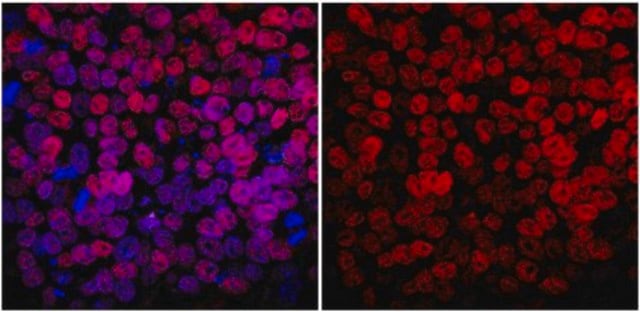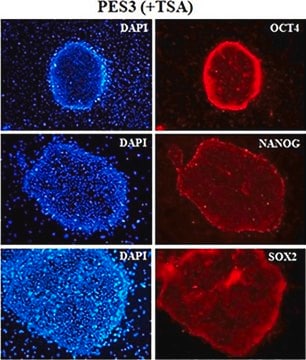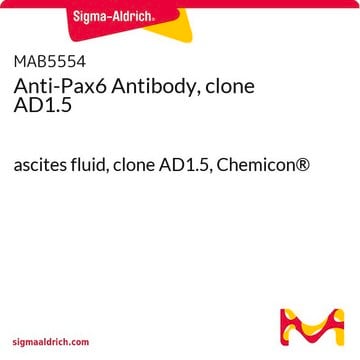MAB4419
Anti-OCT-4 [POU5F1] Antibody, clone 7F9.2
clone 7F9.2, from mouse
Synonym(s):
Octamer-binding transcription factor 3, POU class 5 homeobox 1, POU domain class 5, transcription factor 1, POU-type homeodomain-containing DNA-binding protein, octamer-binding transcription factor-3
About This Item
Recommended Products
biological source
mouse
Quality Level
antibody form
purified immunoglobulin
antibody product type
primary antibodies
clone
7F9.2, monoclonal
species reactivity
human, mouse
technique(s)
flow cytometry: suitable
immunocytochemistry: suitable
western blot: suitable
input
sample type: human embryonic stem cell(s)
sample type induced pluripotent stem cell(s)
sample type: mouse embryonic stem cell(s)
isotype
IgG1κ
NCBI accession no.
UniProt accession no.
shipped in
wet ice
target post-translational modification
unmodified
Gene Information
human ... POU5F1(5460)
mouse ... Pou5F1(18999)
Related Categories
General description
Specificity
Immunogen
Application
Stem Cell Research
Pluripotent & Early Differentiation
Flow Cytometry: Recommended working dilution is 2 µg/mL.
Immunocytochemistry: Recommended working dilution is 1:100 – 1: 200.
Target description
Linkage
Physical form
Storage and Stability
Other Notes
Disclaimer
Not finding the right product?
Try our Product Selector Tool.
Storage Class Code
12 - Non Combustible Liquids
WGK
WGK 1
Flash Point(F)
Not applicable
Flash Point(C)
Not applicable
Certificates of Analysis (COA)
Search for Certificates of Analysis (COA) by entering the products Lot/Batch Number. Lot and Batch Numbers can be found on a product’s label following the words ‘Lot’ or ‘Batch’.
Already Own This Product?
Find documentation for the products that you have recently purchased in the Document Library.
Articles
Skip weekend feedings. Defined serum-free and feeder-free expansion media for human pluripotent stem cells (ES and iPS cells). See publications and protocols.
Skip weekend feedings. Defined serum-free and feeder-free expansion media for human pluripotent stem cells (ES and iPS cells). See publications and protocols.
Skip weekend feedings. Defined serum-free and feeder-free expansion media for human pluripotent stem cells (ES and iPS cells). See publications and protocols.
Skip weekend feedings. Defined serum-free and feeder-free expansion media for human pluripotent stem cells (ES and iPS cells). See publications and protocols.
Our team of scientists has experience in all areas of research including Life Science, Material Science, Chemical Synthesis, Chromatography, Analytical and many others.
Contact Technical Service![Anti-OCT-4 [POU5F1] Antibody, clone 7F9.2, Alexa Fluor™ 488 conjugate clone 7F9.2, from mouse, ALEXA FLUOR™ 488](/deepweb/assets/sigmaaldrich/product/images/405/633/324511fc-ecc5-4c49-9d9d-8cf25ab28d40/640/324511fc-ecc5-4c49-9d9d-8cf25ab28d40.jpg)








